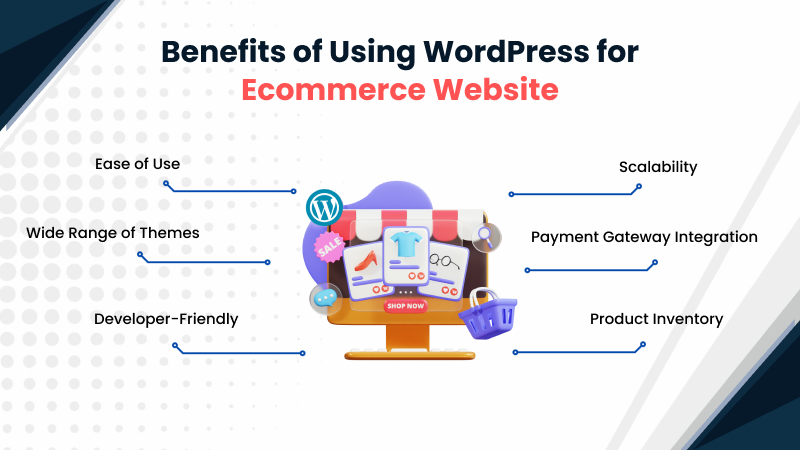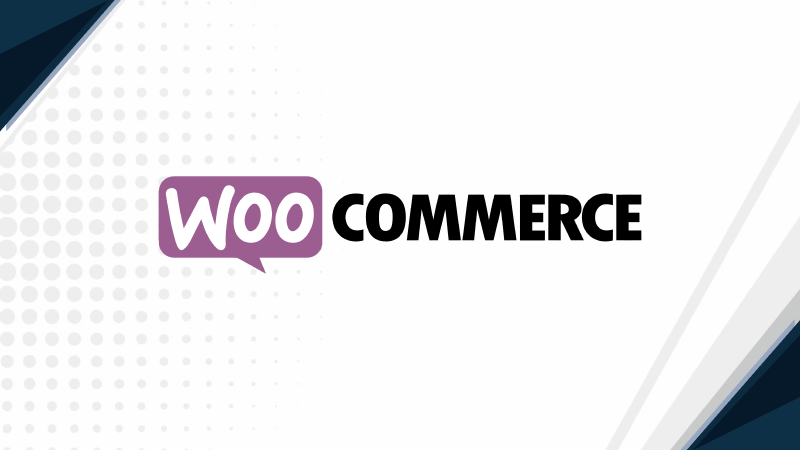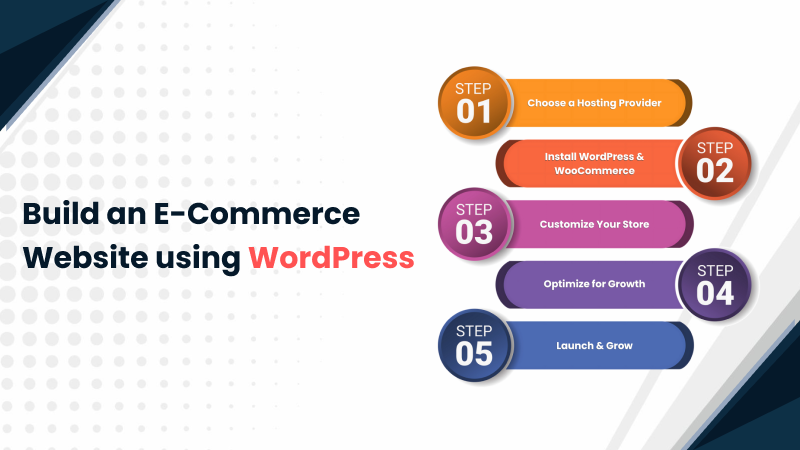
When you hear the word “WordPress” the first thing that comes to your mind is blogging and content marketing. Not surprisingly, it powers around 43% of websites on the internet, thus making it the most popular content management system(CMS) at a world level. But did you know that WordPress is much more than that? It is also a powerhouse for ecommerce.
With the right tools—especially WooCommerce, which currently runs 26% of all ecommerce stores—WordPress transforms into a fully functional online store. From small-scale enterprises to large enterprises, it provides flexibility, scalability, and customization options that many dedicated ecommerce platforms fail to provide.
Of course, WordPress isn’t the only player in the game. Online selling platforms like Shopify and BigCommerce are tailored for exactly that purpose. But does that mean WordPress isn’t a good fit for your store? Absolutely not! In fact, we take WordPress even further by boosting website speed by 40% and increasing sales by 18%—all with a free migration and a 60-day money-back guarantee.
So, why should you consider WordPress for your ecommerce business? In this blog post, we’ll explore the top benefits of using WordPress as your ecommerce platform and how to set it up to increase your sales.
Let’s get started!
Why Choose WordPress for Ecommerce?
WordPress is not just a blogging platform but a highly customizable Content Management System (CMS) that can be transformed into any website type, including a fully serviceable ecommerce store.
What makes WordPress a watershed moment for ecommerce? Endless integrations, complete customization, and unmatched scalability. With so many themes and plugins available, you can tailor your store to fit your brand dreamily, and its user-friendly interface makes managing your online shop easy-peasy.
WordPress is a solid hand-picked if you’re looking for an ecommerce platform that grows with your business.

Benefits of Using WordPress for Ecommerce Website
Thinking about building an online store? WordPress is loaded with functionalities that make it simple, economical, and scalable to operate an ecommerce business.
Let’s dissect the benefits of using WordPress for your ecommerce store.
Free and Easy to Use
The best thing about WordPress is that it's a free and open-source platform where you won’t have to pay a single penny to start. Even WooCommerce, the widely liked ecommerce plugin for WordPress, is free to install.
Aside from the cost benefits, WordPress is unbelievably user-friendly – for setting up and managing your ecommerce store, you don’t have to be a coder or possess high-level technical expertise. The in-built dashboard and content management system ensure that anyone can build and run an ecommerce business by itself.
Hundreds of WordPress Themes to Choose From
One of the biggest perks of using WordPress for ecommerce? The endless variety of themes! Whether you want a polished, modern design or something classic, there’s a theme for every business type and style.
If you are setting out and working with a small sum of money, free themes can get your shop up and running without costing any money, but as your business grows, investing in a custom WordPress theme can take your store to the higher gear. A custom theme is:
Tailored to your brand—making your store look unique and professional
Optimized for speed and performance, ensuring a smooth shopping experience
Designed for scalability so your store can grow without limitations
A fast-loading, well-optimized theme is not only about aesthetics, but it also directly impacts your store’s success. A slow website can likely drive customers away, whereas a high-performance theme keeps them engaged and increases sales.

WooCommerce Plugin
If you’re using WordPress for ecommerce, WooCommerce is your bosom buddy as it smoothly integrates with WordPress and makes your site into a fully serviceable ecommerce store in minutes.
With WooCommerce, you can:
Manage products, inventory, and orders effortlessly
Offer multiple payment & shipping options
Customize your store with themes and extensions that fit your business needs
Grow your business, no matter if you are running a tiny shop or a growing enterprise.
WooCommerce's adaptability and powerful tools make it a great choice for entrepreneurs looking to set up a money-making online store. If you're launching your first shop or growing an existing venture, WordPress and WooCommerce band together to create a firm ground for online retail success.
Developer-Friendly and Highly Customizable
WooCommerce is a great platform to use – its open-source design gives you total freedom to tweak and build an online store that fits your exact needs. With a huge collection of hooks, filters, and APIs, coders can:
Integrate third-party plugins & themes seamlessly
Modify store functionality to add custom features
Enhance performance & security for a better user experience
WooCommerce offers thorough guides, a lively group of developers, and regular improvements and that’s what a developer needs to build and keep up a top-notch online shop. With the help of WooCommerce, you can create anything just the way you want it – from a simple store to a complex marketplace with many sellers.
Built-in SEO Advantages
A well-designed store looks great, but what’s the point if people can’t find it? Luckily, WordPress has an in-built SEO feature that helps your store rank higher on Google and draw more customers – one of the most search-engine-friendly platforms.
To give your SEO a boost, you can turn to plugins like Yoast SEO—one of WordPress's most popular add-ons with millions of active users. Yoast SEO helps you:
Make your product pages more attractive to search engines
Enhance meta descriptions and keywords to increase visibility
Bring more traffic to your site, resulting in higher sales
Many prosperous online stores depend on WordPress due to its SEO-friendly structure and ability to rank better in search results
A Scalable Platform That Grows with Your Business
Using WordPress and WooCommerce to run your online shop gives you a big edge: you can grow it as much as you want. You can start small with just a few items or build it up into a huge online store.
WordPress adapts to your needs – its building-block setup lets you start simple and add new stuff when you need it; you don't have to switch to a different platform. You'll find thousands of add-ons to make your shop just right for your business. You can do all sorts of things, from advanced product filtering to multi-channel selling at once.
WooCommerce works great with WordPress's way of handling content, so you can take care of your products and your website content without breaking a sweat. It also runs well on different types of hosting. This means you can upgrade your hosting plan as more people visit and buy from your site, keeping everything running even as you get bigger.
When you choose WordPress and WooCommerce, you're not just making a shop for right now—you're setting up something that can change, grow, and do well as your business does.
Multiple Payment Gateways for Smooth Transactions
A smooth checkout experience is key to converting visitors into customers, and WooCommerce delivers by posing many payment gateways to match everyone’s preferences.
With WooCommerce Payments, you can accept payments outright on your site, while integrations with PayPal, Stripe, Square, Amazon Pay, etc., can make transactions more secure and effortless. The platform even:
Automatically detects a customer’s location to display the right currency & tax rates
Offers flexible payment options, including AfterPay and Authorize.Net
Supports additional extensions to further expand payment methods
Having a variety of trusted payment options means fewer abandoned carts and more completed purchases, helping you grow your business with ease.
Easy Product Inventory & Management
Managing your online store shouldn’t be a touch match, and with WooCommerce, it is not! Even those with minimal technical experience can easily use the platform to manage their product inventory and management.
The user-friendly dashboard lets you add, edit, and organize products while keeping everything centralized. Moreover, WooCommerce is equipped with important inventory management tools such as:
Bulk product import/export—perfect for stores with large catalogs
Customizable product attributes—sizes, colors, variations, and more
Inventory tracking—so you never oversell or run out of stock
Need even more control? WooCommerce provides many plugins and extensions to improve inventory management so that you can custom-tailor everything to accommodate your business's necessities. Whether you own a small boutique or a large retail outlet, WooCommerce helps you keep your inventory organized and uncomplicated.
Analytics & Performance
With real-time integration of Google analytics with Woo Commerce, you don’t have to worry about how your store is doing now – you will get insightful information about your customer behavior, sales trends, and website performance.
With this integration, you can track:
Where is your traffic coming from? Organic search, social media, ads, etc.
Conversion rates—see how many visitors turn into paying patrons
Sales data—analyze what products are performing best
These insights will improve user experience (UX), boost sales, and modify your marketing tactics for your online retail store. Making data-determined decisions, however, can assist your ecommerce business to expand more successfully and efficiently.
Drawbacks of Using WordPress for Ecommerce Website
Though WordPress is a potent and flexible platform for ecommerce, yet it poses some drawbacks. Let’s take a look!
WordPress Is Not Only Designed For Ecommerce
WordPress – is a content management system, not an ecommerce platform, and it was originally created as a tool to publish blogs. Nevertheless, with WooCommerce, a WordPress account can easily be converted into a ready-to-use online store. This means
You may miss out on some built-in ecommerce features found in dedicated platforms.
Certain advanced ecommerce tools might require extra plugins or custom development.
Compared to plug-and-play ecommerce platforms, WordPress involves more setup and upkeep, making it far more difficult to manage an online business.
Potential Plugin Compatibility Issues
While the vast number of plugins available on WordPress is incredibly beneficial to users, this can also cause compatibility problems. Many plugins are not made to be used together, which can result in glitches, slower loading, and even a breach of your security.
Here’s what to watch out for:
Installing too many plugins on your website can make it slow and also breach your security.
Some plugins are not maintained, which can cause other performance-related issues.
Some plugins may struggle with each other, causing errors or broken functionality.
It's preferable to stay with premium, well-reviewed plugins to avoid these problems. Our developers advise having between 10 and 25 essential plugins; if you use more than that, you may be experiencing performance problems.
Security Concerns
Like any popular platform, WordPress is a common target for hackers, especially ecommerce sites handling customer data and payments – however, this doesn’t mean WordPress is integrally unsafe; you just need to take the right steps to keep it secure.
Wordfence stands out as one of the top tools to protect WordPress. It's a security plugin that many people use. In 2019, Wordfence stopped 18.5 billion attacks on WordPress sites, and by 2021, it had blocked over 86 billion attempts to guess passwords – showing how well it works in these 2 years.
To keep your online shop safe, you should:
Update WordPress, WooCommerce, and all plugins to fix weak spots in security.
To prevent hackers, create secure passwords and implement two-factor authentication.
Get WooCommerce support services to make sure your site stays as safe as possible.
If you follow good security practices, your WordPress online shop can be as safe as any other platform.
Is WordPress Good for Ecommerce?
You bet! Numerous websites, including successful ecommerce sites, are built on WordPress. With countless possibilities to customize it to meet the unique needs of your company, this free open-source platform puts you in control of your online store.
The powerful plugin WooCommerce is the foundation of WordPress ecommerce, transforming your website into a serviceable online store. With WooCommerce, you can:
Tweak layouts and designs to perfectly align with your brand.
Include as many product variations as you want: sizes, colors, pricing options, you get the idea.
Use point-and-click page builders to create eye-catching product pages, shopping carts, and checkout processes—no need for coding expertise.
Monitor inventory and promotions in an instant to guarantee that users are satisfied with your store activities and that they will keep returning to your store.
Using WordPress and WooCommerce is as simple as it can get for any business out there, from selling uniquely crafted items to operating a sophisticated ecommerce store.

How Do I Set Up WordPress to Create an Ecommerce Website?
So, if you’re choosing WordPress for your online store, you made a good call, but now you might be asking yourself, "How do I set up an ecommerce website using WordPress?" Well, it’s not as difficult as you might imagine, so don't worry! Here’s how:
Pick a Trustworthy Web Host & Set Up WordPress
To start your online store, purchasing a reliable web host for your WooCommerce shop is a must. The web host needs to provide reasonable loading speeds, sufficient storage space, and, most importantly, the ability to scale the store in the future. WP Engine, SiteGround, and Bluehost are some of the hosts people prefer for WooCommerce hosting. After you create your hosting account, try setting up WordPress (most web hosts do this for you with one click).
Select a Theme That Fits Your Brand
You can pick an ecommerce theme for your website from a range of free and paid options on WordPress, and it doesn't have to be too expensive to match your company's purpose. If you're simply starting a new business or website, you can always go with the free option and upgrade later on. In addition, productivity plus customization is guaranteed through premium themes like Storefront, Flatsome, Astra, and many more.
Install WooCommerce: The Core of Your Shop
An online store can be fully functional with the help of WooCommerce, the most powerful WordPress ecommerce plugin, which we are now going to install. WooCommerce enables you to:
Add and control products (including different variations, digital downloads, and subscriptions).
Take payments using many payment gateways like PayPal, Stripe, and others.
Keep track of stock, taxes, and shipping choices.
Make your store better with extra plugins for things like subscriptions, product reviews, and discounts.
Customize and Optimize Your Store
Once WooCommerce is installed, it’s time to personalize your store to create a smooth shopping experience:
Add functionality with WooCommerce extensions (shipping calculators, automated tax calculations, or live chat).
Make your site mobile-friendly so customers can shop from any device.
Speed up your site with caching plugins and optimized images for a smooth user experience (UX).
Optimize for SEO using plugins like Yoast SEO to rank your store higher on the Google search engine page.
Launch & Grow Your Ecommerce Business
After you have ticked all the boxes, check your website to see if you can efficiently do everything from product browsing to checkout. Afterwards, you can start your store and don’t forget to use SEO, email campaigns, social media, and ads to attract clients!
You can rest easy, your company has the potential to grow because now you have a reliable, flexible, and scalable e-commerce platform with WordPress and WooCommerce.
Your company has the strength to develop with the help of WordPress and WooCommerce because now you have a robust, flexible, and scalable ecommerce platform. So, perform the following steps and have a feature-rich ecommerce store adapted to your needs in a flash!
Final Thoughts
The most popular content management system (CMS) is WordPress, and it is also a very strong and adaptable option for ecommerce companies. With WooCommerce, WordPress can turn into a very user-friendly serviceable ecommerce store that includes product management, payment processing, and customizable templates.
Using WordPress for ecommerce results in unmatched flexibility as they can use thousands of themes and plugins to build their store the way they want to. Additional features can be added with plugins such as advanced SEO, marketing automation for ecommerce websites, and monitoring customer feedback.
Some challenges include the lack of security, issues with plugin compatibility, and overall management obstacles posed to novice-level users. Unlike Shopify, Magento, and other sophisticated ecommerce platforms, it does not have that level of Iceberg scorer features and instruments as it was primarily designed to be a blogging platform.
If you are a mid-tier company or an entrepreneur on the hunt for a customizable and affordable ecommerce solution, WordPress, together with WooCommerce, would be ideal – you can create a profitable online store that expands with your company by using the right setup and security precautions.
Searching for experienced developers to assist you in creating a WordPress website? Get your ideal website by getting in touch with Expedey.
Recent Blogs
What is Meant by Trustless Transactions in Blockchain?
Discover how trustless transactions in blockchain eliminate the need for intermediaries, ensuring transparency, security, and automation through smart contracts. Explore the future of decentralized, trust-free transactions
How To Build A Responsive Website
Discover the importance of responsive web design and how to create a mobile-friendly website that adapts to any screen size. Learn essential tips to enhance user experience and boost your site's performance.
How To Optimize Website Performance
Struggling with a slow website? Discover top web performance optimization strategies to improve speed, enhance UX, and rank higher on search engines.
Quick Links
Our Offices

USA
12828 Willow Centre Dr Ste D #978 Houston, TX 77066
PAKISTAN
Suite # 207, 2nd Floor, Park Avenue Building, Block 6, P.E.C.H.S, Shahrah-e-Faisal, Karachi.Contact Us
© 2024 Expedey. All Rights Reserved.

